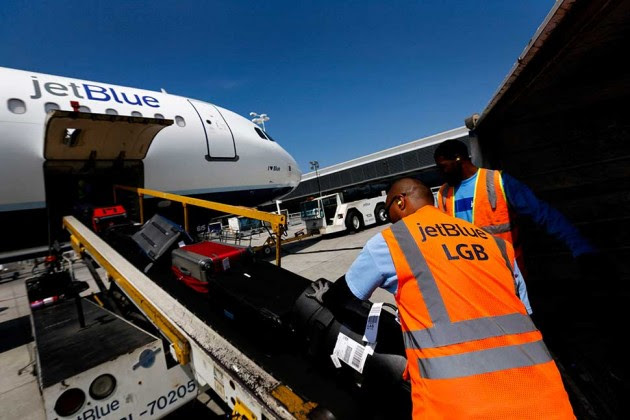 And another domino falls. And another domino falls.
In a surprise move that shouldn't have been, Jetblue, one
of the holdouts in the airline industry for not charging for a first
checked bag - is now considering adding the fee, as the carrier
overhauls the way it prices tickets.
In a Bloomberg article last
week, "the concept of a first-bag fee is on the table," said JetBlue
Chief Financial Officer, Mark Powers. "There is a construct under
which we would, in effect, be able to charge for bags."
Putting Customers First to Putting Profits First
Shares
of JetBlue Airways shot up to a 7 1/2-year high last week, after Wall
Street cheered turnover in the air carrier's strategy, in which it will
start favoring shareholders over customers.
According to TheStreet,
that spike was due to institutional investors' and analysts' faith that
Dave Barger, JetBlue's CEO, will soon be replaced by a new top
manager. (Barger's contract is up in February 2015, but
there is speculation that he might depart sooner, allowing current
JetBlue president Robin Hayes to assume Barger's role.)
What's so
good about Barger leaving? Barger is known as a champion of the
customers-first school of business that underlies JetBlue's strategy of
delivering upgraded service at affordable prices. In the view of
analysts, some of whom have called for Barger's dismissal, that approach
has kept JetBlue from "fully realizing its profit potential".
"JetBlue
is an overly brand-conscious and customer-focused airline, which has
resulted in lagging fundamentals," said analyst Helene Becker in a note to clients. "The changes would improve the financial outlook for the company in our opinion."
Another profit area being discussed is reducing legroom and adding more rows of seats. MarketWatch outlines two
actions that would "quickly and easily" pad JetBlue's profits. One
would be to add 12 more seats to each of the airline's A320 aircraft. Second would be imposing fees for the first checked bag and for inflight WiFi.
You have to wonder, do analysts ever fly Economy class? And, when did analysts take over management's duties at companies?
If I
were a shareholder whose investment had risen 49% so far this year, I
would wonder why management was changing anything about the way it
conducted business.
We Don't Need No Stinking Customers!
Such changes
would be treason for JetBlue loyalists, for whom the spacious seating
and absence of junk fees have been key reasons to book JetBlue over the
competition. Even the number-crunchers acknowledge that a remodeled
JetBlue would jeopardize the considerable brand equity the airline has
built up over the years.
Most
U.S. low-cost carriers choose to either be a "fun" and "customer
friendly" airline or an ultra low-cost carrier that charges you for
everything. For JetBlue, it has chosen the first path. That is a big
reason why it attracts a loyal following.
Today,
companies are criticized by Wall Street for being customer-focused and
favoring passengers over the stockholders. JetBlue has earned a special
place with travelers, but it now appears they will be joining the race
to the bottom for the sake of the bottom line.
Can a company ever get too focused on customers? JetBlue survived the Great Recession due to customer loyalty and offering seat assignments, which Southwest does not.
These are the
same neo-profit "analysts" that are pushing for pay toilets and
bicycle-like "seating" like those patented by Airbus. What's next? How
about getting rid of the co-pilot? Charge passengers by their weight? How do those "analysts" travel? Bus? More likely, limo and private jet.
For investors, the airline's future looks bright. But for travelers, JetBlue's best days may be behind it.
Becoming Just Another Flying Cattle Car
JetBlue's
strength was their product and the value for money that it provided. It
has previously played to that strength. If JetBlue tries to make price
their big selling point, then they become one of many.
Robin Hayes, JetBlue's new president, said its investment in a partnership with Dublin-based Datalex,
will provide the technology as a foundation for a "new merchandising
platform" for the airline, "went a little bit unnoticed." JetBlue and
Datalex announced the partnership in January.
"This
strategic agreement with Datalex will further strengthen our
e-commerce capabilities with a state-of-the-art merchandising platform
and expanded self-service capabilities," said Eash Sundaram, JetBlue's
chief information officer when the deal was announced.
Killing The Goose That Propels Your Golden Egg?
JetBlue
is frequently more expensive than other airlines when looking at the
base fare only; their value was always in what was delivered for that
fare.
JetBlue
has always been more attuned to the needs of its customers than to Wall
Street. That's how it has built its current success. But
the shareholders are pushing the position that a lot of extra cash is
going out the door just to be able to say that they allow two free
checked bags, especially when most of their competitors are doing it. Sure, but it's hard to look at Delta Airlines, United Airlines and American Airlines making all that money on bags to not join the club.
Perhaps
JetBlue's history of 'solid profits' is because people prefer flying
with them to avoid paying a bag fee. Once they start nickle and diming
their customers they lose that advantage. Are they proud of the fact that they are one of the few remaining airlines that still allow free checked bags?
A
company putting the customer first is a rare thing these days. And an
airline offering roomy seats in coach is extremely rare. Getting rid of
these means JetBlue becomes no different from the other airlines, packing as many people in as they can. They risk losing their key market differentiator.
Southwest, Anyone?
Could this affect Southwest's two free bag policy?
If
JetBlue still allows holders of its credit card to get one bag
free, it may counter some of the upset that a bag fee is inevitably
going to cause. But if they charge everyone a fee in the future,
passengers may jump to Southwest without hesitation.
Until Southwest charges for checked bags! | 




 We
live in an older community and we realized that it was entirely pitch
black, no one had any candles or flashlights and we were pretty sure
some folks must have been hurt so we checked the neighbors to assure
ourselves they were ok.
We
live in an older community and we realized that it was entirely pitch
black, no one had any candles or flashlights and we were pretty sure
some folks must have been hurt so we checked the neighbors to assure
ourselves they were ok.

